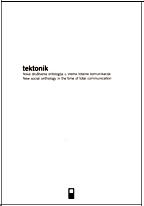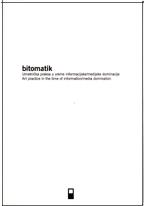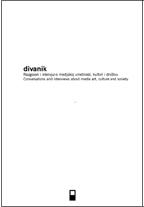kuda.org (eds.): tektonik: New Social Onthology in the Time of Total Communication (2004) [English/Serbian]
Filed under book | Tags: · biotechnology, commons, control society, genetics, globalisation, internet, networks, technology

“tektonik is a collection of texts, transcripts of lectures and interviews with researchers, theoreticians, artists and activists who have been guests of the kuda.lounge program between 2001 and 2004 at the kuda.org New Media Center. The selected texts, lectures and interviews in this edition are a kind of research intersection in the domain of new technologies, culture and society, research of phenomena such as globalization, technological systems of control, mass communication and the Internet, new social movements, the new proletariat and new economy, the problem of intellectual property rights, and biotechnology. Given that society at the beginning of the twenty-first century is a media-saturated global society, particular focus has been directed towards the problem of the mediation of information which creates current reality.
From the very outset kuda.lounge has been a platform for discussion, argumentation and dialog, in the framework of which more than fifty presentations, lectures and workshops have been organized. In inviting key names involved in critical thinking and social theory and practice, kuda.org has attempted to offer the local public an insight into contemporary social questions in the world and to establish frequent and lasting communication and cooperation between local theoriticians and activists and an international network. At kuda.org the public has had the opportunity to hear lectures from Saskie Sassen, Steve Kurtz, Geert Lovink, Konrad Becker, Cindy Cohn and many others.
The development of information and communication technologies has introduced a new social ontology which has manifested itself on the political, cultural, economic and psychological plane. In a time when the promises of a techno-utopia are being transformed into highly-operationalized intelligent machines which serve economic interests, or into trainee virtual units for future conflicts (parallel education and training via computer games as combat simulation, unmanned flying craft – predators), the question is, to what extent can new technologies be used to fulfill some of the promises, pressing in the eighties and early nineties, in the prime of the so-called California ideology? Those promises included social prosperity, creative work, the creation of new workplaces, shortened working hours, global peace in an era of global enlightenment enabled by technology.
Via the texts in this collection we come face to face with warning projections of a dehumanized future determined by the interests of capital, a telling critique of technical-science as the ultimate generator of the capitalist machine. In opposition to this, we can see models of how the potential of new information and communication technologies can be used for democratization and realization of the project of a “better society”.
During the nineties the Balkans was a real battlefield where these global theories “fell in the water” and intersected with specific local interests. A particular idiosyncracy of the local context in the countries of the former Yugoslavia was the comprising of socialism as an idea, the direct or indirect threat of war, life in authoritarian centralism or in a neo-liberal framework of roughshod transition, which also precipitated distrust in broader social action. Parallel with the wars of the nineties, in Serbia a model of accelerated privatization of the public space and an ‘accelerated end’ of the industrial society was carried out, after which Serbian society found itself in limbo between its industrial past and an information-based future, waiting for the reopening of factories that would never be reopened.
The goal of the lectures and discussions was to critically analyze certain socio-political phenomena, to point to the root of the problem and present this to a wider public. The kuda.org center opens the possibility and space of different interpretations and models of the past, present and future social context, mapping those processes which could potentially endanger human freedom using the sophisticated methods of a high-tech society in a time of the knowledge economy. With the publication of this collection we conclude a cycle which has integrated subjects detecting general social problems, and in a “classical” print medium present them to a wider public.”
Contributions by Saskia Sassen, Micz Flor, Geert Lovink, Konrad Becker, Steve Kurtz, Kristian Lukic, Relja Drazic, Raqs Media Collective.
Serbian title: tektonik: Nova društvena ontologija u vreme totalne komunikacije
Publisher Futura publikacije, Novi Sad, 2004
kuda.read series, 001
Creative Commons Attribution-NonCommercial-ShareAlike 1.0 License
ISBN 8671880265
150 pages
PDF, PDF (updated on 2018-6-17)
Comment (0)kuda.org (eds.): bitomatik: Art Practice in the Time of Information/Media Domination (2004) [English/Serbian]
Filed under book | Tags: · capitalism, computer art, floss, internet, media theory, networks, software art, wireless networks

“bitomatik is a collection of texts, transcripts of lectures held at the New Media Center kuda.org between 2001 and 2004. The texts describe models of comtemporary artistic production which use different media as a means of expression. Drawing on the activist-artistic practice of Novi Sad in the sixties and seventies, a period of the neo-avant garde, the kuda.org Center has examined those phenomena containing an interdisciplinary and cross-media character. From the very outset, kuda.lounge has been a platform for discussion, argumentation, dialog and the contextualization of artistic practice, in the framework of which more than fifty presentations, lectures and workshops have been organized. Particular attention has been paid to communication and the exchange of ideas, primarily owing to the fact that the arts’ scene in Serbia during the nineties developed within a context of what is often called ‘Art in a Closed Society’, which resulted in a syndrome of self-referential artistic production. The Internet and the development of communication technologies formed the electronic backbone of social movements in the late nineties and the early part of this new century, and at the same time connected a smaller circle of Novi Sad artists (the Absolutely Association, Andrej Tišma, the Videomedia festival) which in spite of the odds established contact with the international scene, and brought members of this network to present their work in Novi Sad. International mailing lists such as Nettime, Syndicate and Spectre played a central role in this communication.
In inviting key names in media art and theory, kuda.org has attempted to offer the local public an insight into international contemporary artistic practise. The local population has had a chance to familiarize themselves with the work of leading international and local artists, theoreticians and arts’ groups such as Critical Art Ensemble, Bureau d’Etudes, Armin Medosch, and Inke Arns. Lectures and presentations within the framework of kuda.lounge are orientated towards researching new media related to social activism, media theory, and conceptual art, new-media “genres” such as net.art, software art, interactive art and generative art are explored .
The question of the so-called new media is quantitively identical to problems dealt with by the neo-avant-garde of the sixties and seventies, which conducted experiments with installations and video and electronic sound. These problems deal with the question of the relationship between medium and content, i.e. what’s new in new media. Media research is the history of researching communcation and extroversion and in itself simultaneously bears the political, seeking channels to address the masses and send a message. The avant-garde’s aspiration to penetrate society, to reach ground zero, and lead it in the utopian project of creating a fair society is closely connected to media research. The contents of this collection present different research and experiments in new media and a kind of manifestation of the artistic avant-garde at the close of the 20th century and the dawn of the 21st century.
These two elements; society as an object of intervention by an artistic project, and media research via which this intervention is to be carried out, are the basis of this collection of texts. This publication brings a cycle integrating debates and discussions on contemporary artistic practice to a close, and in a print medium presents them to a wider public.”
Contributions by Eric Kluitenberg, Darko Fritz, Armin Medosch, Inke Arns, Critical Art Ensemble, Bureau d’Etudes, and Raqs Media Collective.
Serbian title: bitomatik: Umetnička praksa u vreme informacijske/medijske dominacije
Publisher: Futura publikacije, Novi Sad, 2004
kuda.read series, 2
Creative Commons BY-NC-SA 1.0 License
ISBN 8671880273
168 pages
PDF, PDF (updated on 2021-12-11)
Comment (0)kuda.org (eds.): divanik: Conversations and Interviews about Media Art, Culture and Society (2004) [English/Serbian]
Filed under book | Tags: · capitalism, internet, interview, media art, media culture, media theory, tactical media, technology

“divanik is a collection of interviews conducted in the period from 2001 to 2004 which represents intersection of research in the field of new technologies, culture and society. Interviews present network of people and organizations that make one part of the contemporary media art and theory scene. New media center_kuda.org monitored those phenomena that have interdisciplinary and intermedial character, and by inviting the significant protagonists in media art and theory the intention was to give to the local public an insight at the happenings in this field.
Research of the media is the research of the history of communication, and communication today is a bio-product of the information age, exchange of valuables in the capitalist coordinate system in which the concepts and ideas are treated as meaningful goods and products. On the other hand communication is also a tool that changes the same coordinate system.
As a communication practice the phenomenon of the interview is immanent to Internet culture. Interview represents concise form of communication and it is a useful instrument in the scientific work as meta-text that follows complex theory or artwork. In the interviews authors present contexts in which they were creating and their points of view and this direct communication through the actual questions presents real-time articulated energetic potential. That is also a chance to analyze and restructure certain topics in the form that couldn’t occur in theoretic and artistic work. Interview is a sublimation of different aspects, overlapping and interdisciplinarity that at a given moment presents unique thinking system.
The development of information and communication technologies also brought along new social ontology that is manifested in the social, political and culture field. Instantaneity of history, accumulation and pace of technological development stipulates momentary reaction and critical analysis.
The goal of these interviews is to critically analyze and present to the wider audience certain art and socio-political phenomena. Within the kuda.read edition the accent is put on pointing out to the expanded referential system inside the new media and culture that spreads from the marginal social practice to academic theory and scientific research.”
Includes interviews with Geert Lovink, Raqs Media Collective, Saskia Sassen, Marcus Neustetter, Bureau d’Etudes, Marina Grzinic, Cindy Cohn, and Steve Kurtz.
Serbian title: divanik: Razgovori o medijskoj umetnosti, kulturi i društvu
Publisher Daniel print, Novi Sad
kuda.read series, 003
Creative Commons Attribution-NonCommercial-ShareAlike 1.0 License
ISBN 8690621105
123 pages
PDF, PDF (updated on 2018-6-17)
Comment (0)
